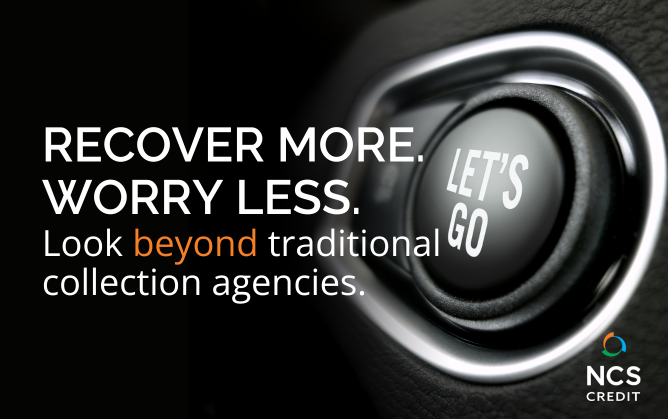Consider Trying a Collection Agency Offering Contingent Services
Today’s 3-in-3 features NCS Credit Attorney, Michelle Gerred. Read on to learn more about why you should use a collection agency offering contingent collection services, like NCS, before writing off bad debt.
What Is a Contingent Collection and How Does It Work?
Michelle: NCS will work the commercial collection placement on a contingent basis, meaning the fee you pay is contingent upon and a percentage of the amount of money NCS successfully collects.
The collection placement can be secured or unsecured and managed by our in-house collection experts or through an attorney.
Once we receive the commercial collection placement and supporting documentation, we will complete additional research on your customer to see if we can find alternative addresses, phone numbers, and contacts to reach out to. Then we send an initial demand letter, along with proof of the past-due debt (such as invoices or a statement of account) to your customer.
Depending on the service you select, we may begin contacting customer via phone and email to see if we can collect the money owed (possibly setting up a payment plan) or help resolve any existing dispute.
What Are NCS’ Different Services and What Are the Differences Between Them?
Michelle: We provide both in-house and attorney services. Let’s focus on our in-house services. For in-house collections, we offer 2 different services: 10-Day Free Demand and Immediate Collection Placement.
With our 10-Day Free Demand, we send a demand letter to your customer. If payment is received (and you report the payment to NCS) within 10 days, no collection fee is due. Essentially, if your customer pays within 10 days from the date of the demand, and you let NCS know you’ve been paid, the demand letter is free! So, what happens if your customer doesn’t pay? On day 11 we begin actively working the collection, which will include calls to your customer, and our contingent collection rate will apply.
With our Immediate Collection Placement, we begin contacting your customer within 24 hours of receiving the placement and our contingent collection rate applies.
Why Should I Try Collection Agency Over Simply Writing Off the Debt?
Michelle: I think the better question is why wouldn’t you try? Write-offs are expensive! The cost to write off bad debt is not just the amount of the bad debt; it costs a great deal more to recover that lost revenue. For example, if you write off $50,000 at a 30% margin, you would have to generate $166,667 in additional sales to recover that lost profit.
3-in-3 Takeaways
- Contingent collections are a great alternative to writing off past-due accounts.
- The cost of a write-off is more than the cost of the debt.
- NCS, a reputable commercial collection agency, provides different services to best meet your collections needs.
Wondering what to do with your past-due accounts? Contact us & our in-house collection experts will review your situation and provide you with possible solutions!
Editor’s Note: This content was originally published in February 2017. It has since been updated and revised for 2024.


